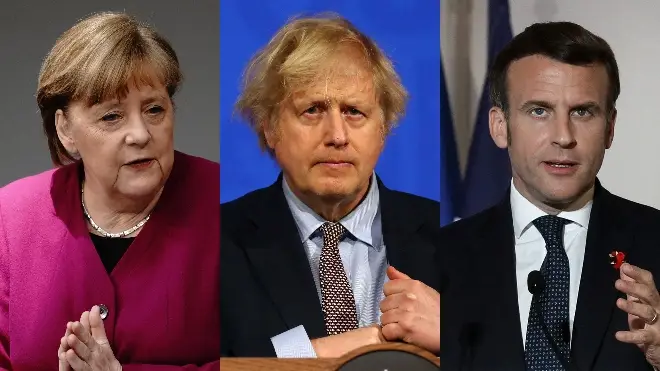
Paul Brand 3pm - 6pm
30 March 2021, 05:57 | Updated: 30 March 2021, 17:44

Boris Johnson is among a group of two dozen world leaders calling for a global treaty to help countries prepare for future pandemics.
The UK Prime Minister was joined by 23 other world leaders, including French President Emmanuel Macron and German Chancellor Angela Merkel, in calling for a unified approach to the next international health crisis.
However, notable names missing from the list include US President Joe Biden and Chinese leader Xi Jinping.
In a letter published in the Daily Telegraph and other papers across the globe, the group said the post-coronavirus world needs to protect the health of future generations against potential pandemics in a coordinated fashion.
It also recommended the creation of a new treaty for pandemic preparedness and response.
The group added that Covid-19 has provided a "stark and painful reminder that nobody is safe until everyone is safe".
In a press conference on Tuesday, World Health Organisation director-general Dr Tedros Adhanom Ghebreyesus said: "The time to act is now.
"The world cannot afford to wait until the pandemic is over to start planning for the next one. We must not allow the memories of this crisis to fade and go back to business as usual."
So far, there have been nearly 2.8 million coronavirus-related deaths worldwide and more than 127.5 million infections, according to figures compiled by Johns Hopkins University.
Read more: PM warns 'we don't know' how robust UK's defences are against new wave
Read more: PM announces deal with GlaxoSmithKline for 60m Novavax vaccine doses

PM responds to question about prospect of another lockdown
The letter said the virus has been the "biggest challenge to the global community since the 1940s", noting the two world wars in the first half of the 20th century led to an era of cooperation between nation-states.
It said: "Today we hold the same hope that, as we fight to overcome the Covid-19 pandemic together, we can build a more robust international health architecture that will protect future generations.
"We believe that nations should work together towards a new international treaty for pandemic preparedness and response.
"Such a renewed collective commitment would be a milestone in stepping up pandemic preparedness at the highest political level."
There is a shared commitment to "ensuring universal and equitable access to safe, efficacious and affordable vaccines, medicines and diagnostics for this and future pandemics", it added.
Read more: PM says international travel rules remain unchanged as lockdown eased
Read more: London records zero Covid deaths on one day for first time in six months

Ben Kentish sums up key points from latest PM Covid press briefing
In addition, the new international treaty would look to improve cooperation across a range of fields, from systems alerting about potential pandemics, to the sharing of data and distribution of vaccines and personal protective equipment.
The letter said: "At a time when Covid-19 has exploited our weaknesses and divisions, we must seize this opportunity and come together as a global community for peaceful co-operation that extends beyond this crisis."
On Monday, Mr Johnson warned it is unclear how strong the UK’s defences are against a new wave of coronavirus infections despite the success of the vaccine rollout.
The prime minister warned of the spike in cases currently affecting Europe, and added it was “inevitable" as restrictions in the UK are eased “that there will be more infections and unavoidably more hospitalisations, and sadly more deaths".
Speaking at the Downing Street Covid briefing, he said: "What we don't know is exactly how strong our fortifications now are, how robust our defences are against another wave.
"What we need to do is to continue flat out to build the immunity of our population, build our defences against that wave when it comes."